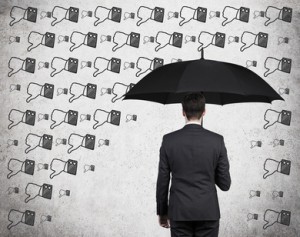We have all experienced a significant rejection or failure that has led us to doubting our own abilities or potential. How we deal with such adversities is what helps us reverse their negative impacts and find ways to grow. Rejection comes in multiple forms and interpretations, and regardless of the supposed degree of importance, any rejection can be notably traumatizing. A bad breakup, losing a friend, or being rejected by a college or employer—could all be equally emotionally disturbing to the individual. When giving someone advice on how to deal with a certain issue, cliché phrases—that tend to make sense—may not be helpful. Everyone reacts to problems differently, and there are different levels of emotion and experience that play into why something hurts someone so significantly.
I remember a time in high school when I ran for president of the student advisory board at my local library. I practiced my speech over and over again, even to my parents. It was my first big step out of my comfort zone and away from the quiet, shy individual I was before. When time came to actually give the speech, I decided to omit parts of it to keep it short and sweet like the speeches of those who came before me. I didn’t truly want to stand out. I made the mistake of cutting out my ideas for future events and improvements. I delivered my shorter speech perfectly and nonchalantly without notecards, and I was proud of myself until the last candidate stepped up onto the stage with a long speech in hand. She was visibly shaking, and stumbling on her words, but the messages within her speech showed a true care for helping the organization—and like that, my confidence and perfect speech was shot. I knew that my mistake had cost me the election and that I was watching my hard work unravel right in front of me. I also sympathized with her anxiety and could see that she would be a diligent leader.
For me, that loss was the catalyst for many insecurities, and it drastically reduced my belief that I had the potential to do or achieve anything. Fortunately, after years of self-improvement, I am able to look at the situation in a positive light. Running for a high position in any club or organization was a fear of mine, and I overcame that fear. I put myself out there and delivered a great speech with confidence. I showed my parents how passionately I can work in order to achieve something that I desire. The rejection was traumatic, but it changed my life and essentially helped to make me into the confident person that I am today. Later in high school, I became the president of two clubs and successfully led fundraisers and events.
Here is my advice for dealing with trauma caused by rejection:
Find a way to express your deepest emotions- I never told my closest friends about the election and I didn’t have anyone I could confide in at the time. The absence of an outlet to discuss my trauma led to its long-term negative impacts. I never spoke about it aloud, but I wrote down all my feelings in a journal. Journals, blogs, safe forums, friends, family, therapists, poetry—all of these can be positive support systems when dealing with traumas.
Don’t let your rejections define who you are- As mentioned before, my rejection led to further negative experiences and thoughts. I let it define me and my capabilities, which in turn held me back from achieving my truest potential. There are several different forms of rejection and they all have different effects, but we should always focus on the positives in any situation; Such as bettering oneself, or simply better preparing oneself for similar events in the future.
Let your recovery take its time- you can’t rush remedying your feelings. It takes time to truly feel the way you want to about an event. For example, if you cut a toxic friend out of your life, it may take months before you truly believe that it was the right decision. It helps, however, to interpret the situation in multiple perspectives. I may have felt like I failed, but there must have been at least one voter who admired my confidence—I would think of that as a lie the day of the election results, but today it is something that I truly believe.
Rejection is as powerful and defining as you allow it be. You can choose to learn from the experience or let it weigh you down. And doesn’t matter who was a part of the experience unless they’re able to help you recover. Every event in life, positive or negative, is an opportunity to change yourself for the better.









Leave A Comment